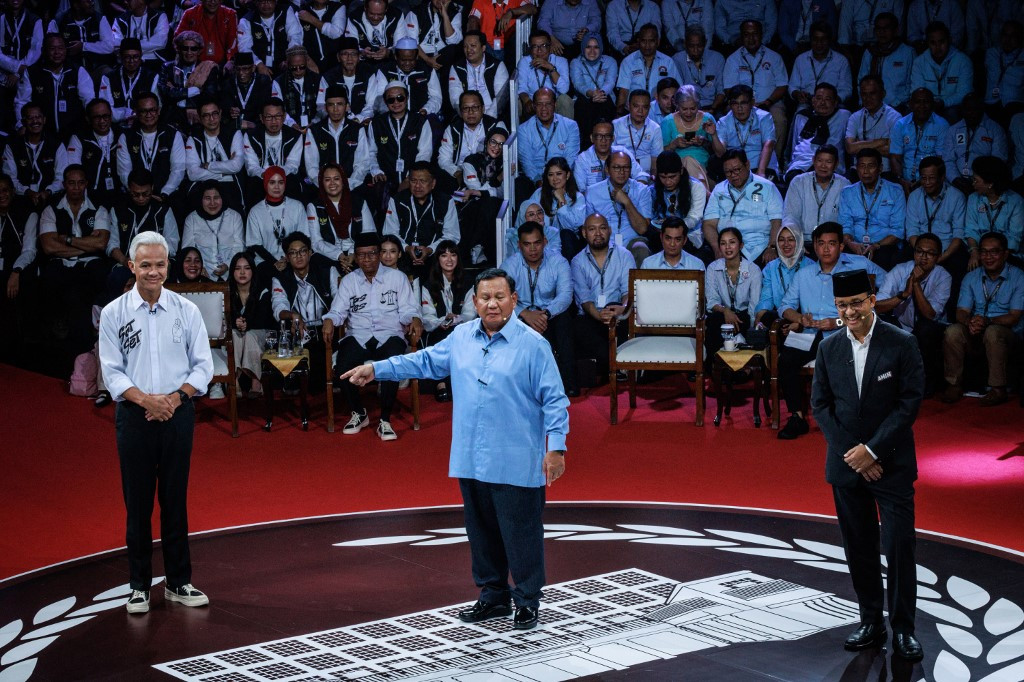Popular Reads
Top Results
Can't find what you're looking for?
View all search resultsPopular Reads
Top Results
Can't find what you're looking for?
View all search resultsDebating democracy
It remains to be seen if a Kennedy moment will happen in Indonesia and define the outcome of the presidential election on Feb. 14, 2024.
Change text size
Gift Premium Articles
to Anyone
 Defense Minister and presidential candidate Prabowo Subianto (center) along with the other two presidential candidates, former Jakarta governor Anies Baswedan (right) and former Central Java governor Ganjar Pranowo, speaks during the first presidential election debate at the General Elections Commission (KPU) office in Jakarta on Dec. 12, 2023. (AFP/Yasuyoshi Chiba)
Defense Minister and presidential candidate Prabowo Subianto (center) along with the other two presidential candidates, former Jakarta governor Anies Baswedan (right) and former Central Java governor Ganjar Pranowo, speaks during the first presidential election debate at the General Elections Commission (KPU) office in Jakarta on Dec. 12, 2023. (AFP/Yasuyoshi Chiba)

In a democratic election, public debates are crucial as they allow presidential candidates to expand and refine their policy ideas, which will make sure the checks-and-balances mechanism works when they get elected.
The first of five official debates sanctioned by the General Elections Commission (KPU) on Tuesday gave the public an opportunity to assess the candidates’ understanding of, and commitment to, good governance, the rule of law and the protection of human rights. Some punches and counterpunches added spice to the 150-minute contest of ideas among the three candidates, Anies Baswedan, Prabowo Subianto and Ganjar Pranowo. Unfortunately, in some instances, the debate was reduced to an argument that turned personal, if not ill-tempered.
Take the response of Prabowo to Anies’ criticism of democratic regression, the narrowing space for freedom of expression and restrictions on the opposition, which have characterized Indonesia under the current administration. Instead of proving Anies’ claim wrong, Prabowo said a faulty democracy would not have allowed an opposition figure like Anies to run for public office.
Anies contested the 2017 Jakarta gubernatorial election with the backing of Prabowo’s Gerindra Party. The 2019 presidential election was payback time for Anies as he supported Prabowo’s second attempt to win the highest office.
The turning point came in 2019 when Prabowo accepted President Joko “Jokowi” Widodo’s olive branch and joined the ruling coalition. On Tuesday, in countering Prabowo’s jab, Anies said his former ally had lost steam while in opposition. “He said himself that when he wasn’t in power, he couldn’t do business,” Anies said, referring to Prabowo.
The sub-theme of the debate, human rights, was a difficult front for Prabowo to handle, due to his connection to several past human rights cases. He clearly looked unhappy when Ganjar asked him about the settlement of past human rights abuses, calling Ganjar’s question “tendentious”.

The campaign team of each presidential candidate claimed to score a win after the heated debate, but several observers have given Anies the edge, partly because he campaigned for change, in tune with the public concerns about many government policies.
While presidential debates in Indonesia only debuted in 2004, they have been a significant part of United States politics, at least since 1858, when Republican candidate Abraham Lincoln and Democrat contender Stephen Douglas engaged in seven rounds of debate, largely about the issue of the extension of slavery into the territories.
But perhaps it was the 1960 debate between then vice president Richard Nixon and senator John F. Kennedy that changed the landscape of modern politics. Thanks to television, voters could see candidates debating their agenda in a close and personal way. The televised debates allowed Kennedy to tip the balance in his favor against the frontrunner Nixon.
It remains to be seen if a Kennedy moment will happen in Indonesia and define the outcome of the presidential election on Feb. 14, 2024.
Pollsters found that presidential debates hardly swayed voters in the elections between 2004 and 2019. To explain the phenomenon, Saiful Mujani of SMRC believes those who watch the televised debates have already made up their minds. They are glued to the TV only to reaffirm their choices.
The debates, according to Saiful, have failed to reach the floating masses, who make up the middle- to lower-income strata of society. They are usually not interested in watching the debates, or lack access to a TV or the internet.
But with internet penetration today estimated to reach 213 million of the country’s population of 275 million, presidential debates will in many ways impact voters’ behavior. With around 30 percent of voters remaining undecided, the presidential debates may change the course of the race, which has seen Prabowo in front so far.
There are four rounds of debates awaiting the presidential and vice presidential candidates before voters go to the polling stations in February. Their mastery of substance, fresh ideas and ability to convey their messages will help them win the hearts and minds of voters.









